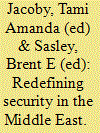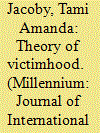| Srl | Item |
| 1 |
ID:
046300


|
|
|
|
|
| Publication |
Manchester, Manchester University Press, 2002.
|
| Description |
ix, 176p.
|
| Standard Number |
0719062330
|
|
|
|
|
|
|
|
|
|
|
|
Copies: C:1/I:0,R:0,Q:0
Circulation
| Accession# | Call# | Current Location | Status | Policy | Location |
| 046220 | 355.033056/JAC 046220 | Main | On Shelf | General | |
|
|
|
|
| 2 |
ID:
141201


|
|
|
|
|
| Summary/Abstract |
What (and who) is a victim? In contemporary violent conflicts, the construction of grievance-based identity is a fundamentally contested process as the lines between victim and perpetrator are blurred by ongoing cycles of belligerence and retribution. As victims are incorporated into broader political campaigns, it becomes nearly impossible to separate the victim from the politics. The ubiquity of victims in international politics is a serious challenge to International Relations theory as categories of victim and perpetrator are generally treated as ‘prior or external to analysis’ instead of as propositions for further inquiry. This article formulates a political theory of victimhood driven by a distinction between victimisation as an act of harm perpetrated against a person or group, and victimhood as a form of collective identity based on that harm. It proposes a sequence of five stages that victims experience from the act of victimisation to the recognition of victim-based identity: (1) structural conduciveness, (2) political consciousness, (3) ideological concurrence, (4) political mobilisation and (5) political recognition. The article explores the stages with concrete examples and offers three main challenges for future research. First, as an identity, victimhood is more prominent in societies that recognise justice. Second, victimhood accompanies struggles for recognition. Third, victim rivalries obfuscate straightforward analysis of victimhood in conflict zones.
|
|
|
|
|
|
|
|
|
|
|
|
|
|
|
|